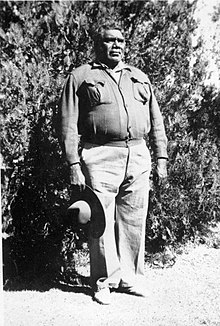Albert Namatjira
Albert Namatjira | |
|---|---|
 Albert Namatjira, 1949 Alice Springs | |
| Born | Elea Namatjira 28 July 1902 |
| Died | 8 August 1959 (aged 57) |
| Nationality | Australian |
| Known for | watercolours |
| Spouse | Rubina |
| Awards | Queen's Coronation Medal |
Albert Namatjira (28 July 1902 – 8 August 1959), born Elea Namatjira, was an Indigenous Australian artist. He is one of Australia's most well-known painters. He is best known for his watercolour paintings of the Australian outback landscape. His works were not in the traditional style of Aboriginal art. But they became important to forming the style of modern indigenous art in Australia.
Namatjira was an Arrernte man from the western MacDonnell Ranges area. He was born at Hermannsburg, a Lutheran mission near Alice Springs. He was born as Elea, but once baptised, his parents changed his name to Albert. He had a western-style upbringing on the mission. When he turned 13, though, he returned to the bush for his initiation. He was made a member of the Arrernte community and was introduced to his traditional heritage. Namatjira said this is how he came to understand the kinship with his land that is seen in his works. He eventually become an elder of the Arrernte community.
His first exhibition was held in Melbourne in 1938. Exhibitions after this in Sydney and Adelaide sold out. His art became widely recognised around Australia. A portrait painting of him by William Dargie won the Archibald Prize in 1956.
References[change | change source]
- Kleinert. "Namatjira, Albert (Elea) (1902 - 1959)". Australian Dictionary of Biography. Australian National University. Retrieved 2007-11-16.
Other websites[change | change source]
- Albert Namatjira photograph collection at the National Library of Australia
- Australian Dictionary of Biography entry
- Seeing the Centre: The art of Albert Namatjira 1902-1959 Archived 2010-07-11 at the Wayback Machine, an online exhibition of the National Gallery of Australia
